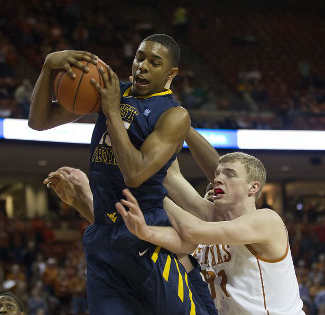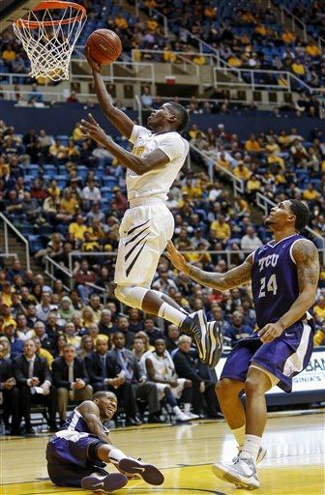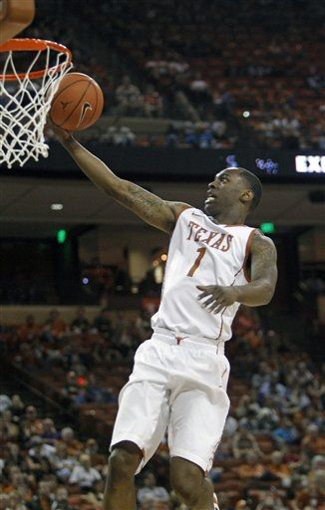WVU Coliseum | Morgantown, WV | Tip: 8 P.M. CT | TV: ESPN LRT Consecutive Game #242 When the suits at ESPN planned out their Big Monday lineup, Texas’ first visit to Morgantown seemed like a no-brainer. With a batch of transfers becoming eligible, Bob Huggins’ Mountaineers looked to be competitive in the middle of a deep Big 12, while Myck Kabongo and the Longhorns were expected to be fighting for a 15th-consecutive NCAA appearance. Instead, both teams have scuttled through disappointing seasons, and are now only hoping to avoid first-round action in the Big 12 tournament. Meet the Mountaineers For an in-depth look at the West Virginia roster, check out LRT’s game preview from the first meeting between these two teams. The first meeting The Longhorns could not score a point before the first media timeout when these two teams played in Austin on January 9th, but their stifling defense kept them in the game. West Virginia was limited to just 30.6% shooting from the field, and the Mountaineers missed their first 14 attempts from three-point range. With the Longhorns only sinking 34.5% of their own looks, it was not a pretty game to watch. Sheldon McClellan (No. 1) struggled against a tight, physical approach from West Virginia, and managed just nine points on 2-of-13 shooting in a reserve role. It was Jonathan Holmes (No. 10) who paced the Horns while battling a big West Virginia frontcourt, scoring 12 points to go with nine rebounds.
West Virginia repeatedly beat Texas to rebounds That Mountaineer frontcourt was trying to dodge foul trouble all night long, even with Aaric Murray (No. 24) and Deniz Kilicli (No. 13) coming off of the bench for Coach Huggins. Kilicli and Dominique Rutledge (No. 1) both had three fouls just 15 minutes into the game, while Murray had two of his own in the first half. Even with the rotating frontcourt, West Virginia was able to reclaim 40% of their missed shots before the break. That trouble on the defensive glass would continue for Texas down the stretch and ultimately prove costly. The Longhorns were up by 10 points with 3:41 to play, giving them a win probability of 98.7% at that point, according to Ken Pomeroy. West Virginia suddenly caught fire from long range, hitting three triples and forcing Holmes to drain his own three in the final seconds just to get Texas to overtime. In the extra period, West Virginia reclaimed 66.7% of their offensive rebounding chances, including three on one trip down the court. After Prince Ibeh (No. 44) made one of two free throws to cut the Mountaineer lead to one point with less than a minute to go, another WVU offensive rebound crushed the Longhorns after they had forced a defensive stop. The Longhorns had one final chance with 15 seconds to go, down by a basket, but a risky pass from Ioannis Papapetrou (No. 33) was picked off by Murray and iced the 57-53 overtime win for West Virginia. Since then… That torrid comeback in Austin was the first of a few valiant efforts by the Mountaineers in Big 12 play, but it was the only one to result in a victory. West Virginia erased an 18-point second-half hole at Iowa State, but lost on a Georges Niang layup in the final seconds. A week ago, the Mountaineers overcame an ice-cold start and a 15-point deficit against Kansas to get within a basket in the second half. Once again, the comeback bid fell short, and West Virginia dropped a 61-56 decision. The Mountaineers were able to build on that late-game surge when they traveled to Lubbock on Saturday. West Virginia posted its best offensive performance of the season, scoring 1.218 points per possession against the Red Raiders. Normally, strong showings against Tech and TCU are not cause for celebration, but West Virginia was able to jump-start its offense with a barrage of three-pointers. For a team that had made just 29.1% of their threes coming into the game, West Virginia’s 10-of-18 performance behind the arc was downright miraculous.
Eron Harris has stepped up in conference play Guard Eron Harris (No. 10) made three of those triples for the Mountaineers, and led all scorers with 18 points. The Texas game was something of a launching pad for the exciting freshman, who made up for a rough outing against the Longhorns by hitting the go-ahead three in the final minute of regulation. Since that game, he’s averaging 13 points per contest and has made at least a pair of threes against four different opponents. The Texas game was also the first that Juwan Staten (No. 3) found himself in the doghouse, as the Dayton transfer was benched for all of the second half and overtime against the Longhorns. He did not play in the following game against Kansas State, and has started just twice since then. Even with Coach Huggins using Staten in his own personal game of Starting Five Hokey Pokey, the senior guard seems to be adjusting. In his last two games, Staten has averaged 12.5 points, a nice bump from his previous season average of 9.5 per game. The Mountaineers briefly experimented with a four-guard look, but have reverted to their traditional lineup. While trying to contain the Cyclones and their floor-spreading attack, Coach Huggins put four guards on the court, and then started just one big in the following game against Purdue. After the Boilermakers whipped West Virginia by a 79-52 count, the project was quickly abandoned. For the Longhorns, the biggest difference tonight will be the absence of Holmes. The sophomore forward broke a bone in his hand on January 21st, and is expected to miss at least three weeks. He was the key contributor in the first game between these two teams, and was the Longhorn best-equipped to handle the physical nature of West Virginia’s frontcourt. One player who will be called on to pick up the slack is undersized forward Jaylen Bond (No. 5). He was the lone bright spot in an embarrassing blowout loss at Kansas State last Wednesday, but was essentially a non-factor in the win against TCU on Saturday. Bond’s interior defense has left a lot to be desired, especially when he gambles for steals and gets out of position. Still, the Longhorns will need a solid performance from him and the freshman bigs if they are going to limit the damage done by Murray. Holmes is not the only player missing tonight’s game due to injury. West Virginia senior swingman Matt Humphrey (No. 21) is also likely to miss his fourth-consecutive game due to a shoulder injury. Although the Mountaineers have adequate depth in the backcourt, Humphrey’s 35.3% mark from behind the arc was one of the best on a poor-shooting three-point team. Keys to the game 1) Limit second chances – There’s no way to completely keep a Bob Huggins team off of the glass, but the Longhorns must do a better job than they did in crunch time of the first game. On many possessions, West Virginia’s best offense is a putback opportunity, so the Longhorns have to follow up their defensive stops with a rebound. Texas allowed WVU to reclaim 39.5% of its offensive rebounding chances in the first game, so the Horns will have to seriously improve on that number to get a road win tonight.
Texas needs a quick start from Sheldon McClellan 2) Get McClellan going – Texas was able to survive a poor showing by McClellan in the first game because of the solid night by Holmes. With the big man now wearing a cast on the bench, even more pressure will fall on McClellan to provide points tonight. He has been visibly frustrated by good defenses in the past, and West Virginia’s rough, suffocating approach could easily get in his head tonight. If McClellan can get a few hoops early, it will help him to avoid forcing things out of frustration and will make things easier for the entire team. 3) Hang on to the ball – The Longhorns coughed it up on more than 20% of their possessions against West Virginia the first time around, which was actually an improvement on their season average. Still, Texas turned it over twice in the final three minutes and another two times in overtime. The Longhorns have had difficulty closing out games all season, and ill-timed turnovers are a big reason why. Texas will have to deal with West Virginia’s physical nature and hang on to the basketball if they want to steal a road win in Morgantown. 4) Make free throws – West Virginia is in the bottom third of D-I hoops when it comes to sending opponents to the stripe, and Texas failed to take advantage of that in the first meeting. The Longhorns made only 44% of their free throws in the loss to West Virginia, sinking just 11 of 25. If Texas leaves that many free points on the table tonight, it’s hard to envision a positive final result on the scoreboard. |











